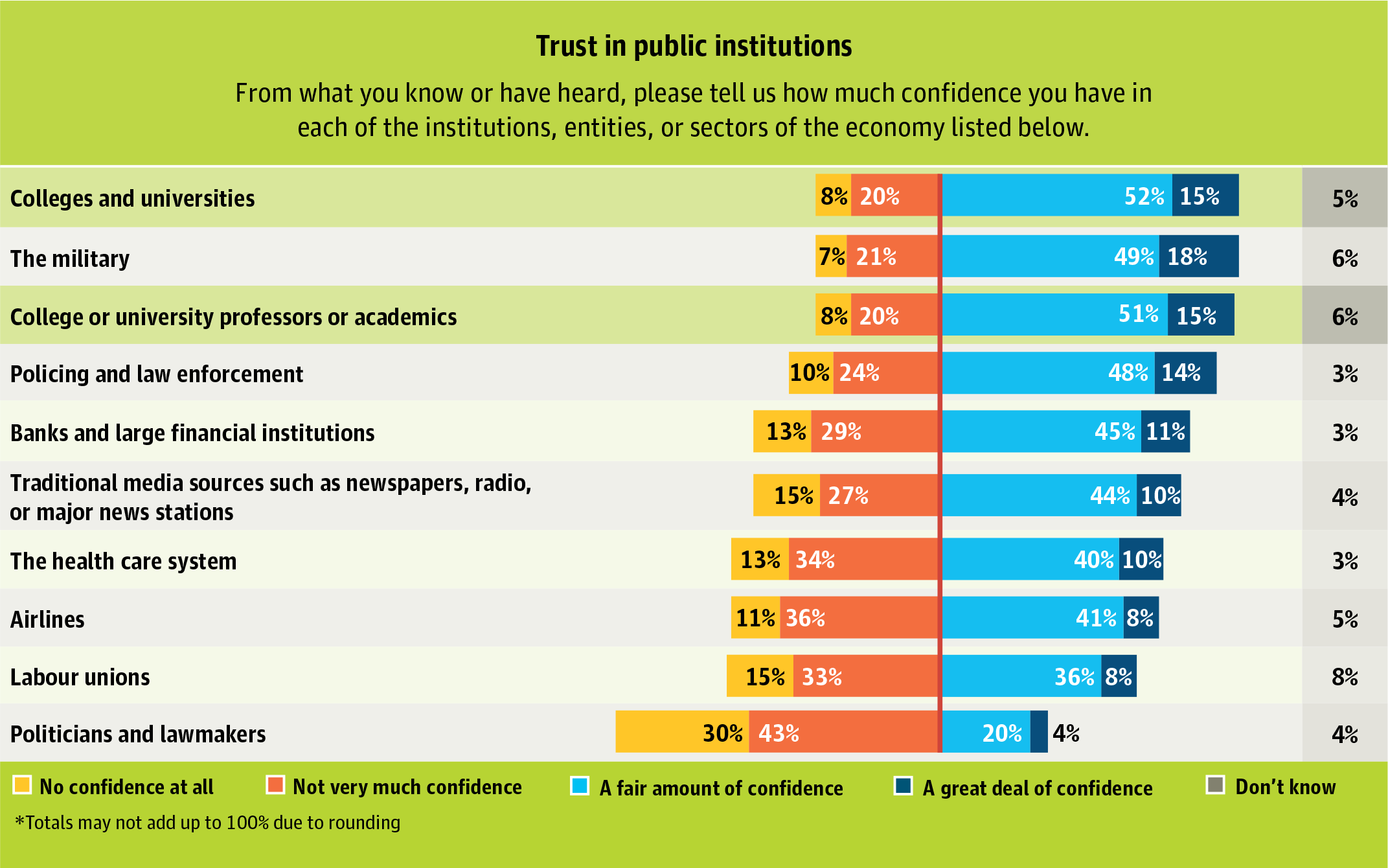By Brad Lavigne
This May, the Canadian Association of University Teachers (CAUT) asked Counsel Public Affairs to do a deep dive into Canadian opinions and attitudes on post-secondary education, academic staff, and social and political conflicts on campuses across Canada.
Counsel, working with market research company Léger, polled over 2,500 Canadians in every region of the country in a comprehensive survey.
One notable observation stood out in the survey’s findings.
Canadians have a high level of confidence in postsecondary institutions and those who teach at them.
When asked to rank institutions they have confidence in, respondents placed universities/colleges the highest (tied with the military), with 67% stating they have a “fair amount” or a “great deal” of confidence. Closely behind were college/university professors/academics, with 65% declaring confidence. Less trusted were the police, banks, media, the health care system, airlines and politicians.
Among the top attributes that Canadians said best describe post-secondary teachers and researchers were that they “make positive contributions to society” (59%) and are “hardworking/dedicated” (55%).
Parents have a high degree of confidence in the quality of education that is provided on Canadian campuses. Seventyfive per cent of respondents with children currently in college or university trust the education that is being provided, while a similar number (73%) believe the same five years after their children graduated.

Further, we tested Canadians’ general attitudes concerning colleges and universities. The sentiment with the greatest level of support was that “college and university education should be affordable for all Canadians” (88%). Next was that “beyond education, colleges and universities offer students important life experiences” (84%), that they’re “essential for building a stronger Canada” (80%), that they should be seen “as essential, not as luxuries” (78%), and that they “play an important role in upholding democracy and democratic values in Canada” (64%).
However, more Canadians believe that higher education has less value today than those who believe its value has increased.
According to the survey, 60% of respondents believe the value of a college or university education has declined over the past four years, with ideological conservatives expressing this sentiment the strongest. But this point should be taken in a larger context as respondents identified nearly every other option as being worse off, with 66% believing the quality of health care has gotten worse, and 77% having less confidence in elected officials today than four years ago.
A strong majority of Canadians also believe that conflicts about politics and social issues on campuses are becoming more severe.
More than two-thirds of respondents believe that conflicts are becoming more severe, with 25% stating they’re getting “a lot more severe.” When it comes to whether Canadians care about these conflicts, more than half say they’re worried about the level of disagreement on campuses.
Finally, we asked respondents what they thought of the job college and university administrators were doing at handling the encampments that were organized on campuses over the summer. While 25% “weren’t sure,” 28% said administrators were doing a good job, while 47% said they were doing a bad job.
In the end, Canadians have high regard for colleges and universities and those who teach at them. The drop in the perceived value of post-secondary education is a product of an overall erosion of confidence in institutions in general.
Despite the slippage, post-secondary education is faring much better than other institutions. We will watch over time whether the social and political conflicts which worry many Canadians will play a role in the future perceptions of the value of post-secondary education in Canada.

Brad Lavigne is a Partner with Counsel Public Affairs, one of Canada’s most respected government relations and public relations firms.
Methodology: 2,521 Canadians, 18 years or older, were surveyed between May 24 and May 29, 2024. The survey was conducted online by the Leger Opinion (LEO) Panel.